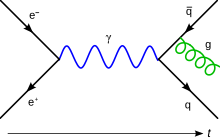Theory
| Quantum field theory |
 |
| (Feynman diagram) |
History of...
| [show]Incomplete theories |
|
|
Theoretical particle physics attempts to develop the models, theoretical framework, and mathematical tools to understand current experiments and make predictions for future experiments. See also theoretical physics. There are several major interrelated efforts in theoretical particle physics today. One important branch attempts to better understand the Standard Model and its tests. By extracting the parameters of the Standard Model from experiments with less uncertainty, this work probes the limits of the Standard Model and therefore expands our understanding of nature's building blocks. These efforts are made challenging by the difficulty of calculating quantities in quantum chromodynamics. Some theorists working in this area refer to themselves as
phenomenologists and may use the tools of quantum field theory and effective field theory. Others make use of lattice field theory and call themselves
lattice theorists.
Another major effort is in model building where model builders develop ideas for what physics may lie beyond the Standard Model (at higher energies or smaller distances). This work is often motivated by the hierarchy problem and is constrained by existing experimental data. It may involve work on supersymmetry, alternatives to the Higgs mechanism, extra spatial dimensions (such as the Randall-Sundrum models), Preon theory, combinations of these, or other ideas.
A third major effort in theoretical particle physics is string theory.
String theorists attempt to construct a unified description of quantum mechanics and general relativity by building a theory based on small strings, and branes rather than particles. If the theory is successful, it may be considered a "Theory of Everything".

No comments:
Post a Comment